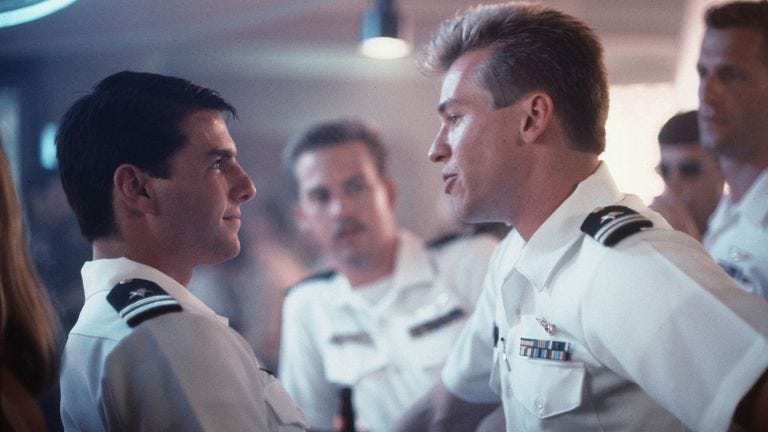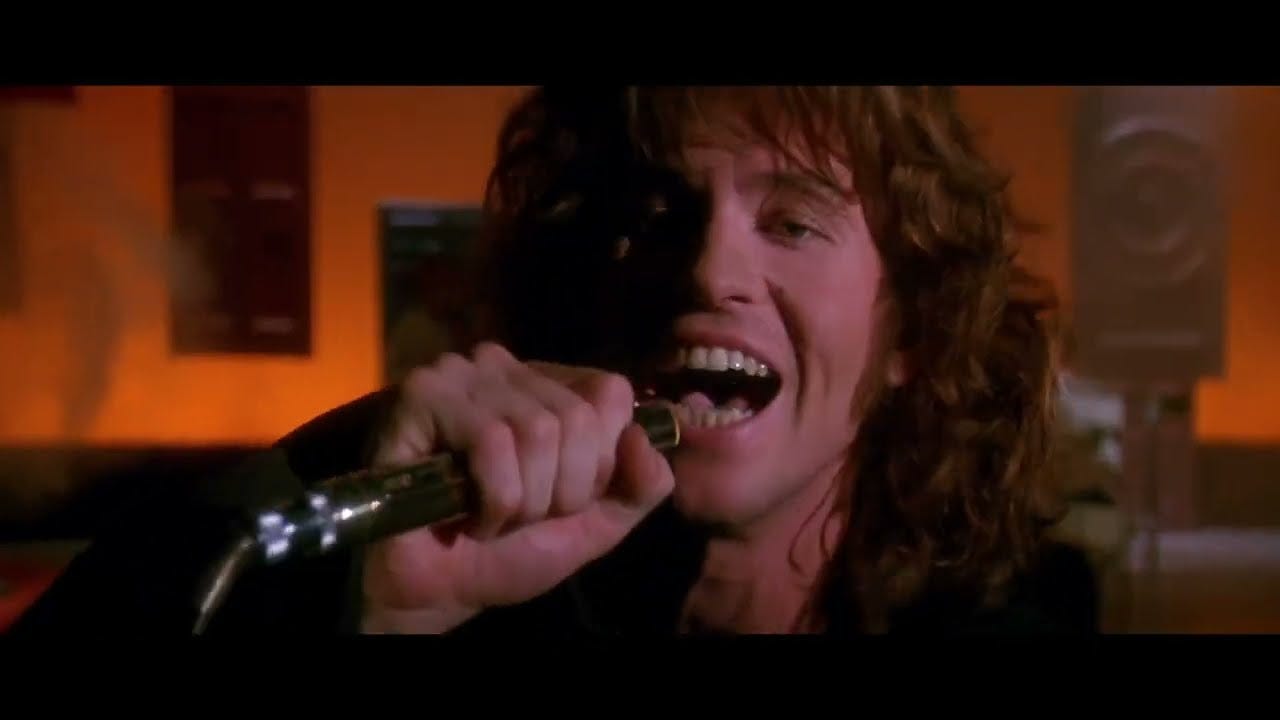“They’re big. And they frolic. Which a lot of people don’t know. They frolic.” Val Kilmer on his buffalo, April 7 1992.
Val Kilmer is my favorite part of Heat. No shade to the laureates in Michael Mann’s 1995 masterpiece, but I live and die by Chris Shiherlis. Kilmer’s Shiherlis is the kind of character that would be a dead man in anyone else’s script: the young adrenaline junkie with a wife and kid back home. Yet Kilmer doesn’t play him as a red-blooded maniac, he plays him as a man with real attachments. The scene between him and De Niro—”the sun rises and sets with her”—is an all-timer. But it’s this scene, where Chris’s wife Charlene (Ashley Judd) signals to him that he needs to disappear, that’s one of my favorites in Mann’s entire oeuvre.
The soft, hopeful tension in Kilmer’s eyes that fades as he realizes his life with her is over. The quiet calculation on his face as he realizes that the slightest flinch will give him away. This combination, the precision of movement with an almost crushing vulnerability, made Kilmer such a formidable supporting actor. Consider him in Top Gun, against Tom Cruise.
The writing in Top Gun (1986) is mostly ridiculous, which is well-suited for an actor like Kilmer who made clear decisions with his performances. He gives Cruise so much to react to—the complete lack of sincerity, the cold hunger of his voice. Kilmer is the exact opposite of Cruise, and I’m not just talking about their characters. Even when he drips with charisma he doesn’t feel like a movie star, especially not in the way that Cruise would become one. No one does “a great Val Kilmer impression.” Kilmer was too interested in character to let his own celebrity get in the way.
Kilmer’s obsession with storytelling animates Val (2021), the marvelous documentary about his life and career. In one scene we see multiple self-tapes of him developing a soliloquy from Hamlet. His rigor, his artistic ethos, his intense, perfectionist work ethic are all on display. Kilmer had long wanted to make a movie about acting—and acting as an artform, not as a practice or extension of celebrity like most celebrity “documentaries” do. His goal was to find part of the character in himself, and himself in the character. It’s that dynamic that makes him endlessly watchable as Jim Morrison in the otherwise miserable The Doors (1991).
This scene is inspired by the Doors’ real performance on The Ed Sullivan Show. Literally nothing that Kilmer is doing is what Morrison did, but because he’s anchored the character with such an evocative vocal performance, he doesn’t need to rely on mimicry to sell the character. The Doors is bad but it showcases the range of one of Kilmer’s most sublime talents: his voice. I’m not just talking about accents, like his magnificently aristocratic drawl in Tombstone, but how he shaped the rhythms and intonations of his speech. You can see this very plainly in his performance as both God and Moses in The Prince of Egypt.
If you can remember the time before animated movies were just Chris Pratt, you might recall that screen actors in animated movies used to give a vocal performance—and In The Prince of Egypt (1998), Kilmer offers two exceptional ones. As Moses, he swallows hard consonants like the “T” in “Egypt” or “won’t,” infusing a breathlessness most apparent on his “W” (”what do you want from me,” “who am I?”). Kilmer’s awestruck Moses sounds far more familiar to an American audience than, say, the polished resonances of his step-brother Ramses (played by Ralph Fiennes) or the Pharaoh (Patrick Stewart). But as the voice of God, Kilmer’s voice becomes clearer and crisper. The tone is similar enough to Moses to allow the audience a glimmer of recognition while capturing something that feels genuinely divine.
As I was rewatching Kilmer’s movies this week, I started thinking about Gary Oldman, or at least how people talk about Gary Oldman. Had Kilmer’s health been better, and he had been able to continue acting, maybe he would have been talked about with that same mythic reverence. Kilmer never got to have the comeback that many other actors of his generation did: Robert Downey Jr., Alec Baldwin, Keanu Reeves, Michael Keaton, even Rob Lowe.
There were a lot more movies I had to cut from this piece to make it a manageable length, but there was a lot more to Kilmer’s talent than a handful of scenes and a thousand words. Like many great actors who did some of their best work in supporting roles, Kilmer was never nominated for an Academy Award. This is the paradox of a truly excellent scene partner: when it’s done right, it’s easy to take it for granted.
Tonight I will probably watch Top Gun for the five thousandth time with my personal wingman. I will scroll through more of his old Reddit comments. I will do my best to frolic.










He was TRANSCENDENT in the doors and that movie made me fall in love with him AND rock n rollllllll … too scared to watch it now due to it aging badly but maaaaan when i was 9?? HUGE. IMPACT.
so many things I love about Heat but yeah, that scene where Shiherlis sees his wife for the last time— absolutely crushing whenever i watch. loved this read!